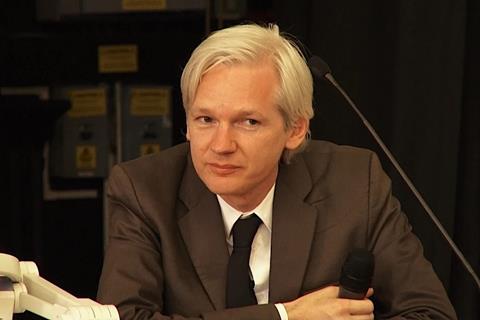Director uses divisive WikiLeaks founder to explore the wider freedom of the press

Dir: Eugene Jarecki. US/Germany/France. 2025. 123mins
Is Julian Assange a crusading independent journalist or a dangerous threat to national security? The Six Billion Dollar Man argues for the former, viewing the Australian WikiLeaks founder as a champion for information in a world in which governments strive to conceal the truth. Eugene Jarecki’s documentary provides a comprehensive overview of Assange’s rise to prominence and US attempts to prosecute him for publishing confidential military materials. But the film ultimately works better as a conversation-starter about the freedom of the press than as a layered portrait of the controversial activist.
Never gives its fascinating subject the close-up he deserves
Initially planned for a Sundance premiere, The Six Billion Dollar Man was pulled in December by Jarecki, who cited “significant recent and unexpected developments” in the story that required him to rethink the final work. Now playing in Cannes as a Special Screening, the film (like fellow festival entry, Raoul Peck documentary Orwell : 2 + 2 = 5) should provoke interest among politically-minded audiences incensed by the lack of government transparency.
This is one of several films about Asssange and WikiLeaks, including Alex Gibney’s 2013 documentary We Steal Secrets and biopic The Fifth Estate, released the same year. Here, Jarecki focuses mostly on Assange’s media organisation, retracing WikiLeaks’ history of working with anonymous sources who had classified information on, for instance, US military war crimes during the occupation of Iraq, and secret US diplomatic cables that illustrated the country’s attempts to undermine democracy in certain regions of the planet. By 2010, Assange was a cause celebre among journalists, while earning the ire of the Obama and, later, the Trump administrations. Just two years later, Assange found himself seeking asylum in the Ecuadorian embassy in London, fearing extradition to Sweden on rape charges which might result in another extradition to America for violating the Espionage Act.
Jarecki’s most notable documentaries — Why We Fight and The House I Live In — criticised, respectively, America’s military and penitentiary systems, and his latest can be seen as a condemnation of the government’s willingness to lie to its citizens. The Six Billion Dollar Man leaves little room for debate about the ethics of WikiLeaks’ publishing of sensitive information, insisting that, as long as the organisation follows journalistic standards, the importance of educating readers outweighs the military’s need for secrecy.
If the film takes that argument as a given, it also rather quickly recaps and moves past a 2010 rape allegation against Assange made by Swedish police on behalf of two of his sexual partners. (Assange denied the allegations, and in 2019 prosecutors dropped their investigation.) We hear a few talking heads refer to Assange as a complicated, imperfect individual but while The Six Billion Dollar Man is far from a hagiography, it rarely delves into his inner life or his motivations. Partly, this is due to the fact that, for much of the five years Jarecki spent working on the documentary, Assange was detained in London’s Belmarsh Prison (he was eventually released as part of a plea deal in 2024). But still, there’s a disappointing lack of curiosity about Assange himself, which robs the film of a compelling emotional core.
Far more persuasive is Jarecki’s overview of how the US tried to (metaphorically) eliminate Assange, although we do hear about Trump’s suggestion that they simply kill him. The documentary points out the irony that when WikiLeaks exposed unethical or unlawful behaviour by the American military in Iraq, the US government’s response was not to investigate the wrongdoing but, rather, go after Assange and the informants for telling the truth. The Six Billion Dollar Man’s wealth of talking heads — including journalists Naomi Klein, Chris Hedges and Jeremy Scahill, not to mention whistleblower Edward Snowden — create necessary context for the significance of such leaks, suggesting that both of the US’s political parties are equally invested in shielding its actions from the public.
As shocking as some of WikiLeaks’ bombshells were, the documentary’s most upsetting material concerns closed-circuit footage of Assange’s seven years in London’s Ecuadorian embassy, in which he basically lived like a prisoner who couldn’t go outside lest he be arrested in connection with the rape allegations. Even here, though, he is but a distant figure — an enigmatic individual we observe but never really know. It’s ironic that, for a film about the fear of constant surveillance, the erosion of truth and the eradication of privacy, The Six Billion Dollar Man never gives its fascinating subject the close-up he deserves.
Production company: Charlotte Street Films
International sales: WME, filmsalesinfo@wmeagency.com
Producers: Kathleen Fournier, Eugene Jarecki
Cinematography: Joe Fletcher, David McDowall, Jack Harrison, Derek Hallquist, Juan Passarelli
Editing: Martin Reimers, David Fairhead, Simon Dopslaf, Zora Schiffer
Music: Niklas Paschburg, Akin Sevgor, Robert Miller, Belief Defect
















![[L-R]: Amanda Villavieja, Laia Casanovas, Yasmina Praderas](https://d1nslcd7m2225b.cloudfront.net/Pictures/274x183/6/4/1/1471641_pxl_20251224_103354743_618426_crop.jpg)








No comments yet